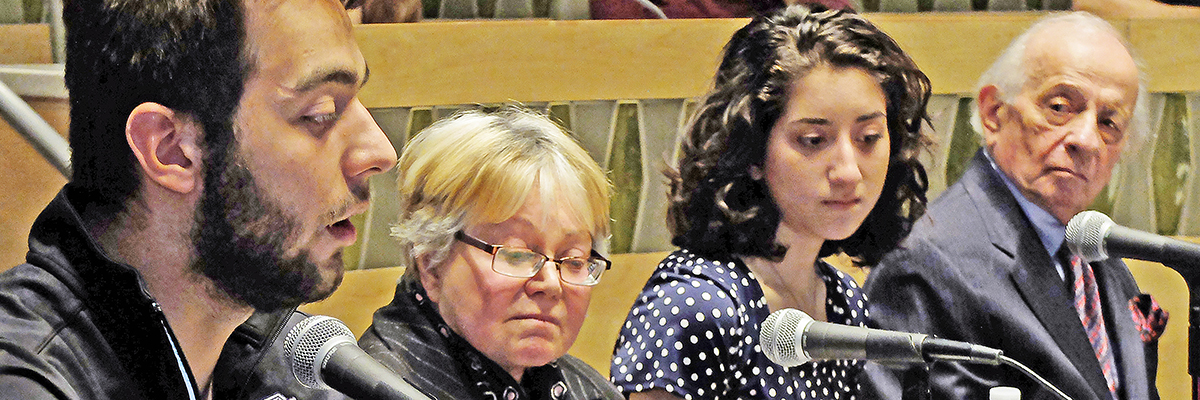Holocaust Genocide and Contemporary Bioethics Program
Promoting education, scholarship and community engagement on the lessons of the Holocaust for health care and society.

“Health professionals played critical roles in the Holocaust, perverting our ethics in ways that have cast a long and dark shadow. This tragic legacy, and the legacy of those who resisted Nazi antisemitism and racism, influences every aspect of modern health care ethics, from our current anti-racism work, to genetics privacy, pandemic response and many other issues. By educating health science trainees on core lessons to be learned from this history, we ensure they will be prepared to face the difficult ethical issues confronting the world today and into the future.”
At the University of Colorado Anschutz Medical Campus, our Holocaust Genocide and Contemporary Bioethics Program promotes education, scholarship and community engagement on the lessons of the Holocaust for health care and society. The program’s goal is to ensure that health professionals always uphold their duty to protect patients, regardless of institutional or government policies that may conflict with their primary ethical obligation to do no harm.
Learning from the Past, Creating a Better Future
- The history of the Holocaust has illuminated many lessons for health science professionals. Examples of these include:
- Simplistic solutions to complex problems are alluring, but misleading and dangerous.
- Concerns about costs of care are important, but must never be used to justify cruelty and unprofessional actions.
- Health professionals have particular responsibility to speak out against racism, antisemitism and other efforts to dehumanize our patients.
At one of the country’s newest and fastest-growing academic medical campuses, we have an important role to play in keeping this history at the forefront for future health leaders. They must learn its ample lessons and understand how these are reflected in health care ethic today. Therefore, our programming focuses on exploring issues critical for emerging health professionals:
- The complex role of science in policy making.
- Navigating professional obligations of patient advocacy and service to the community.
- The essential role of humanism in preserving our sensitivity to human suffering.
- The responsibilities of remembrance, learning and leadership
This program was founded by Dr. William S. Silvers, who endowed our annual Remembrance Day lecture in 2015, and the program was further enhanced in 2022 with the creation of the Silvers Fellowship.
Learn about the Witness to the Holocaust Sculpture Series, 1988-91 by Devorah Sperber is part of the permanent collection at the CU Strauss Health Sciences Library. The sculpture series traveled with the Anne Frank Exhibition for over 25 years before arriving at the University of Colorado in 2018 when the collection was donated by the Sperber family in memory of Henry Sperber, husband, father, and Holocaust survivor.
At this time there is no comparable program operating on this scale at a health sciences campus in the US and our rapid growth is a testament to our commitment and the support of our local community.
PROGRAM ARCHIVE:
2024 Program: Unraveling the Past, Confronting the Present, and Charting an Ethical Future in Medicine: The History and Legacy of the Pernkopf Atlas
2023 Program: Health Professions & Human Rights in Wartime: The Legacy of the Holocaust for Medicine and War Crimes Today
2022 Program: Legacies of the Holocaust and Health Equity Today
2021 Program: Then and Now: Courage, Complicity and Compromise
2020 Program: Cancelled due to the pandemic
2019 Program: Medicine and Morality in Times of War
2018 Program; Echoes of the Holocaust: Cultivating Compassion in 21st Century Healers
2017 Program; Commemorating the 70th Anniversary of the Nuremberg Doctors' Trial
2016 Inaugural Program; featuring Art Caplan, PhD
2008 Inaugural Lecture; featuring Donald Seldin, MD
SUPPORT:
There are several ways to get involved:
Join our mailing list to stay up-to-date on HGCB programming.
Donate to the William S. Silvers, MD, Holocaust Genocide Contemporary Bioethics Program Fund
to support current programming and ensure the future of this program. For information about making a gift to the HGCB Program Fund, contact Carly Werbos in the CU Office of Advancement at Carly.Werbos@cuanschutz.edu.
For information about the HGCB Program, contact Lisa Culhane at Lisa.Culhane@cuanschutz.edu.